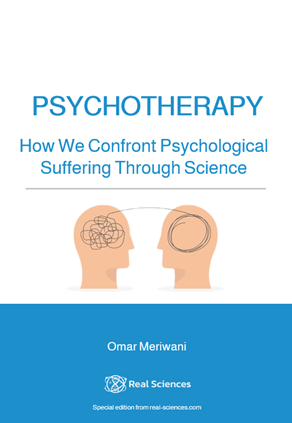Another book by Real Sciences in Arabic Psychotherapy: How We Confront Psychological Suffering Through Science by Omar Meriwani with contribution of other authors and translators from Real Sciences. The book explains the methodologies of psychotherapy and their relationship with science, then provides an explanation of the elements of psychotherapy—the techniques and principles it offers, along with the scientific evidence for them. The book also discusses the relationship between psychotherapy and science, pseudoscience, and pseudoscientific psychotherapies. Furthermore, it addresses the reality of psychotherapy—its application and study in Arab countries—and concludes with a chapter on Carl Rogers and the connection between science and humanism.
Translated excerpt from the book introduction:
For decades spanning from the eighties until the end of the previous decade, terrorism struck numerous cities around the world, primarily in Iraq, Afghanistan, and Pakistan. A portion of the attacks that occurred and killed dozens were suicidal, meaning the perpetrator would sacrifice their own life in exchange for killing a group of other people. Those decades were not limited in their means of bloodshed to suicide attacks alone, but also included retaliatory acts that followed terrorist attacks, or the secondary disturbances resulting from that fierce war. Many attribute that industry of death to mental illnesses or to behavioral disorders, if we exclude the angry opinions that involve criminalizing a specific religion, sect, or race and holding it responsible for the sin of terrorism. In fact, according to existing scientific research, the perpetrators of suicide attacks are most likely not suffering from mental illnesses. As one researcher in the matter stated, studying the method and mindset of those who recruited these individuals is what warrants more thought. If speech is capable of doing all that, then what are the limits of what speech can do?
And if terrorism and its effects are this clear, especially to us who speak Arabic and live in the Middle East and North Africa, it might still be rare enough that one can witness a specific case. But at the same time, every human being is aware of the power of words. Words can make you feel good or bad. Can you remember the last time you felt in a bad mood because of something someone said? Undoubtedly, something has happened in the last few hours or the last week, at least, in the life of any reader of these lines. Primarily through speech, we were raised by our fathers and mothers. Through speech, we received lessons in school. Through speech, we receive our fears, our hopes, and our pains. So, can there be a cure in speech?
ISBN: 978-1-0369-0837-9
Published on 30th December 2024
Link to the Arabic page where the book can be downloaded.


0 Comments